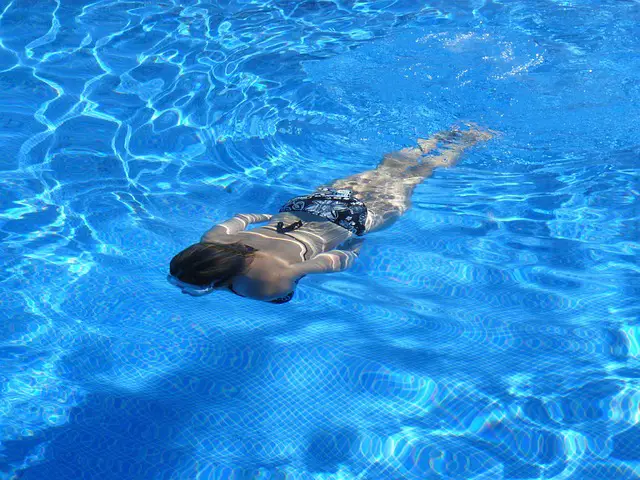What benefits do salt water pools have over traditional pools? Let’s take a closer look in table form at the pros and cons so you can decide whether it makes sense for you or not.
Pros of a Salt Water Pool
| Advantage | Explanation |
|---|---|
| Cleaner Chlorine | Salt water pools use a salt chlorination system that involves adding salt to the water to produced a non-chemical chlorine, unlike traditional pools. This results in a no chemical smell and less irritation to the eyes and skin. |
| Lower Maintenance | Salt water systems require less maintenance, as they automatically produce chlorine as needed rather than adding it manually. This can save time and money compared to manually adding and adjusting chlorine levels in a traditional pool. |
| Soft and Silky Water | Salt water pools have a softer, silky feel compared to traditional pools. This is because the salt in the water may help condition skin and hair since it produces a non-chemical form of chlorine that is different from the chemical version. |
| Reduced Chemical Costs | Over time, the reduced need for added chlorine in a salt water pool can result in cost savings on chemicals and maintenance. When maintained salt water pools tend to use fewer chemicals overall than traditional swimming pools. |
Cons of a Salt Water Pool
| Disadvantage | Explanation |
|---|---|
| Initial Cost | Salt water systems can be more expensive to install initially compared to traditional pools. The salt chlorination system usually adds several thousand dollars onto the pool install cost depending on what model you choose. |
| Salt Corrosion | Salt can cause corrosion to metal parts and surfaces in the pool, including the salt cell, heater, and pump if the salt level is allowed to get too high. A metal ladder is also something to keep an eye on as it can develop rust. |
| Salt Cell Replacement | The salt cell, which is the part of the system that converts salt into chlorine, may need to be replaced every few years, adding to the long-term maintenance costs of a salt water pool. |
| Salt Content | The high salt content in a salt water pool can be damaging to some types of plants and materials, such as stone and concrete, which can result in cracking or staining. Again, as long as you keep salt levels in check, this shouldn’t be a problem. |
| Swimming Experience | Some people may not enjoy swimming in salt water as much as traditional chlorinated water, as the taste and feel can be different. Then again, you’re not supposed to drink pool water and the “difference” in the water often isn’t even noticed by many swimmers. |

